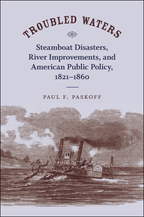
344 pages / 6.00 x 9.00 inches / 8 Halftones, 53 Figures, 2 Maps
In Troubled Waters, Paul F. Paskoff offers a comprehensive examination of the federal government's river improvements program, which aimed to reduce hazards to navigation on the great rivers of America's interior during the early and mid-nineteenth century. Danger on the rivers came in a variety of forms. Shoals, rapids, ice, rocks, sandbars, and uprooted trees and submerged steamboat wrecks lodged in river beds were the most common perils and accounted for the largest number of steamboat disasters. This daunting array of river hazards required a similarly broad range of efforts to remove or at least ameliorate them. Against a variety of obstacles--natural, political, and technological--the river improvements program succeeded in reducing the rate of steamboat loss, even as steamboat traffic dramatically increased. Its success, Paskoff argues, demonstrates that the federal government was far more active than generally thought in promoting economic growth and development in the years leading up to the Civil War.
The river improvements program was one of the most volatile issues in national, sectional, and state politics, touching on questions of economic development, constitutional law, partisan politics, and sectional rivalry. Paskoff examines the controversial program from its beginnings during the early republic to 1844, giving careful attention to the policies of Andrew Jackson's administration. He explores the array of objections to the program--some grounded in a strict interpretation of the Constitution and others in a concern over alleged federal wantonness, corruption, and waste--and follows the political story through the administration of James K. Polk forward to secession. Paskoff also explains the fiscal, economic, and technological aspects of the hazard problem and its solution, analyzing the federal government's fiscal condition, its capacity to undertake such an ambitious program, and the influence of conditions in the larger economy, including effects of the Mexican War, upon the federal government's finances.
Paskoff's lively analysis rests on a bedrock of impressive quantitative evidence, including databases containing every documented steamboat wreck--more than 1,200--on American rivers, lakes, and coastal waters; construction and engine data for more than 600 steamboat packets; and all relevant federal appropriations and expenditures measures, more than 2,300 spending projects in all. Vigorously researched and vividly told, Troubled Waters is an essential contribution to the history of internal improvements in the antebellum United States.
“Backed by abundant research and an avalanche of quantitative data, Troubled Waters presents a number of intriguing arguments that frequently cut across the grain of scholarly conventional wisdom. . . . Troubled Waters is an ambitious, well-crafted work of scholarship, whose insights and suppositions will undoubtedly stir up further investigation into the nation’s antebellum political economy.”—Journal of Southern History
“This is an accomplished and persuasive monograph based on impressive research that contributes significantly to our understanding of the antebellum political economy.”—American Historical Review
“Paul Paskoff has assembled quite the case file, used the evidence to construct some convincing arguments about the interactions between public policy and the rivers themselves, and summarized much of the file in well-organized data tables for the reader’s use. Troubled Waters will be a resource for researchers for many years to come.”—Historical Geography
“Paskoff’s well-written book has a significant strength: the wide range of data he has marshaled and presented in an array of useful figures and charts. It is difficult to imagine another study of the same topic covering its complexities as skillfully and thoroughly.”—Business History Review
Found an Error? Tell us about it.